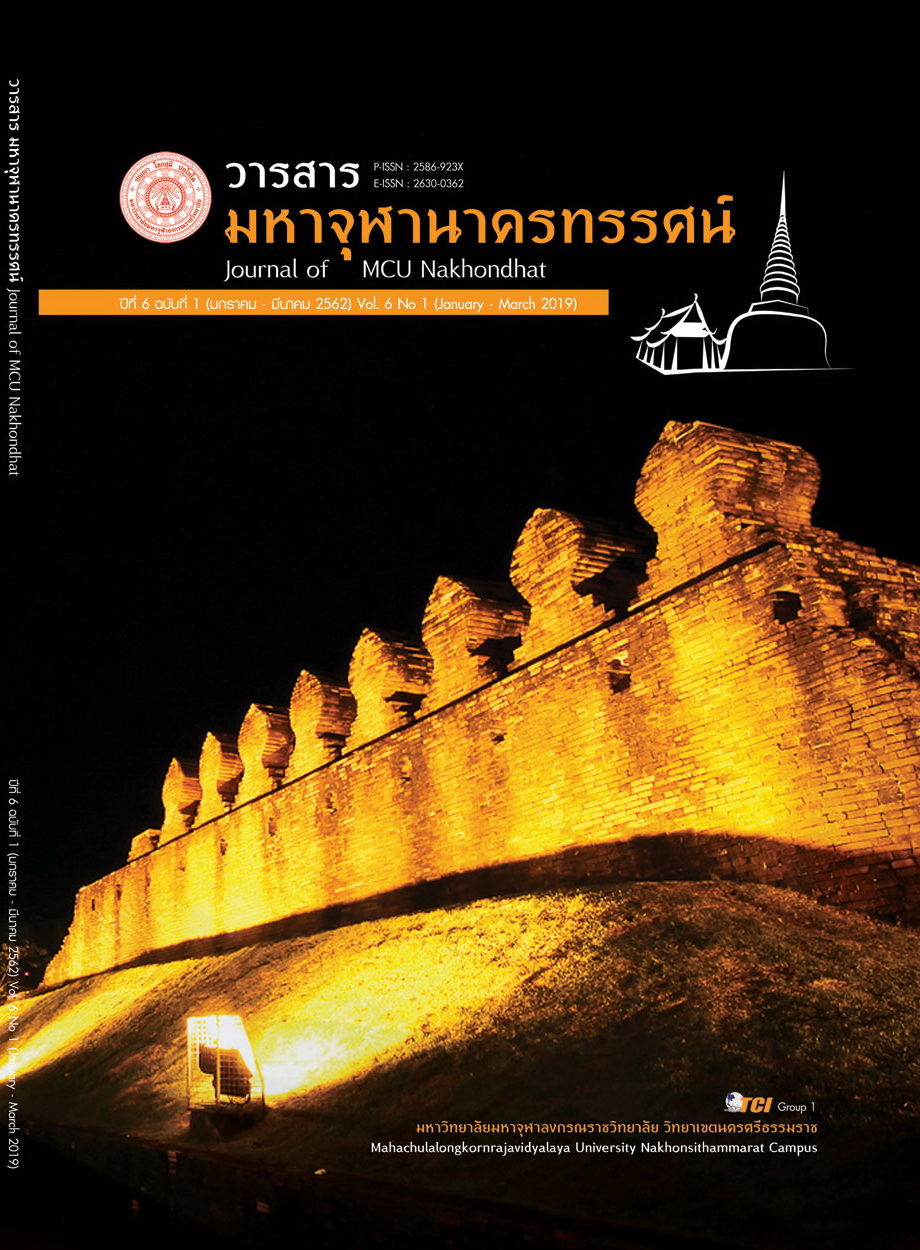DEVELOPMENT OF BUDDHIST PARTICIPATORY MANAGEMENT FOR ADMINISTRATORS ON PRAPARIYATTIDHAMMA DIVISION.
Main Article Content
Abstract
The objectives of This research were: To study the studies of Participatory administration, to develop the participatory administration of the way of developmental participatory administration for Prapariyattidhamma school Dhamma Division in the management at Sangha in section one using the mixed Methodology research as qualitative research in the out of 205 samples and qualitative research by interview of 10 persons and Focus Group Discussion of 10 Persons.
The research of the study found that:
- The studies of Participatory administration at Prapariyattidhamma school Division in the management Sangha in section 1 found that co-thinking and analyzing problems together giving the opportunity the teachers and students join the thirty and show the potential co-thinking apply to join the action plan by the brainstorm for the resources from all parties.
- The development of Participatory administration of administrators the mean score of the right onuses was the highest. The usefulness, appropriateness and fertility were the high level respectively.
- The way of Development of the parties Participatory administration of administrators found that 1) the principle of participation in the 26 aspects 2) The type of participation in the 6 aspects The step or model of participation in 26 aspects 4) styles of participation in 10 aspects 5) Processes of participation in 5 aspects and 6) participatory management of development activities out of 5 activities including the 4 principles of empowerment the 4 principles of empowerment : the principles of performance and the using of success at all.
Article Details
How to Cite
อภิชาโต (อันชูฤทธิ์) พ., งามประโคน ส., & ศิริวรรณ อ. (2019). DEVELOPMENT OF BUDDHIST PARTICIPATORY MANAGEMENT FOR ADMINISTRATORS ON PRAPARIYATTIDHAMMA DIVISION. Journal of MCU Nakhondhat, 6(1), 499–515. retrieved from https://so03.tci-thaijo.org/index.php/JMND/article/view/171910
Section
Research Articles
References
กมล ภู่ประเสริฐ. (2544). การบริหารงานวิชาการในสถานศึกษา. กรุงเทพมหานคร : บริษัทจำกัด ก.พล.
กองพุทธศาสน์ศึกษา. (2561). ทะเบียนรายชื่อครูสอนพระปริยัติธรรม แผนกธรรม-แผนกบาลี ปี 2560. เรียกใช้เมื่อ 6 กันยายน 2561 จาก https://deb.onab.go.th
การกำหนดกลุ่มตัวอย่าง. (2561). เรียกใช้เมื่อ 23 มิถุนายน 2561 จาก https://pioneer.netserv.chula.ac.th.
กีรติ ยศยิ่งยง. (2549). การวางแผนการพัฒนาทรัพยากรมนุษย์เชิงกลยุทธ์ พิมพ์ครั้งที่2. กรุงเทพมหานคร: มิสเตอร์ ก็อปปี้ ประเทศไทย จำกัด.
ชูเลอร และแวนดรา อ้างใน ลดาวัลย์ มชะศรี. (2550). การมีส่วนร่วมการบริหารการศึกษาของคณะกรรมการสถานศึกษาขั้นพื้นฐานโรงเรียนในอำเภอเมือง สังกัดสำนักงานเขตพื้นที่การศึกษาขอนแก่น เขต 1. วิทยานิพนธ์ศึกษาศาสตรมหาบัณฑิต บัณฑิตวิทยาลัย: มหาวิทยาลัยขอนแก่น.
ประคอง รัศมีแก้ว. (2545). รัฐศาสตร์, สังคมศาสตร์. พระนคร: มงคลการพิมพ์.
ประทีป บินชัย และนิพนธ์ กินาวงศ์. (2547). รูปแบบการพัฒนาภาวะผู้นำตามแนวภาวะผู้นำพิสัยสมบูรณ์ของผู้บริหารสถานศึกษาในระดับการศึกษาขั้นพื้นฐาน. รายงานวิจัย คณะศึกษาศาสตร์: มหาวิทยาลัยนเรศวร.
เมตต์ เมตต์การุณ์จิต. (2546). การบริหารจัดการศึกษาแบบมีส่วนร่วม. กรุงเทพมหานคร: บริษัทบุ๊คพอยท์ จำกัด.
เยาวมาลย์ สิทธิเดช. (2559). รูปแบบการพัฒนาบุคลิกภาพสำหรับบุคลากรโรงเรียนพระปริยัติธรรม แผนกสามัญศึกษา. ดุษฎีนิพนธ์พุทธศาสตรดุษฎีบัณฑิต สาขาวิชาพุทธบริหารการศึกษา: บัณฑิตวิทยาลัย: มหาวิทยาลัยมหาจุฬาลงกรณราชวิทยาลัย.
ศิริพร ตันติยมาศ. (2550). รูปแบบการบริหารเครือข่ายโรงเรียนแบบมีส่วนร่วมที่มีประสิทธิผลสังกัดกรุงเทพมหานคร. ดุษฎีนิพนธ์ ปรัชญาดุษฎีบัณฑิต สาขาวิชาการบริหารการศึกษา: บัณฑิตวิทยาลัย: มหาวิทยาลัยศิลปากร.
สุภางค์ จันทวานิช. (2540). วิธีวิจัยเชิงคุณภาพ. กรุงเทพมหานคร: โรงพิมพ์แห่งจุฬาลงกรณ์ราชวิทยาลัย.
Krejcie & Morgan. (2561). ตารางของเครจซี่และมอร์แกน Krejcie & Morgan. เรียกใช้เมื่อ 6 กันยายน 2561 จาก https://sites.google.com
กองพุทธศาสน์ศึกษา. (2561). ทะเบียนรายชื่อครูสอนพระปริยัติธรรม แผนกธรรม-แผนกบาลี ปี 2560. เรียกใช้เมื่อ 6 กันยายน 2561 จาก https://deb.onab.go.th
การกำหนดกลุ่มตัวอย่าง. (2561). เรียกใช้เมื่อ 23 มิถุนายน 2561 จาก https://pioneer.netserv.chula.ac.th.
กีรติ ยศยิ่งยง. (2549). การวางแผนการพัฒนาทรัพยากรมนุษย์เชิงกลยุทธ์ พิมพ์ครั้งที่2. กรุงเทพมหานคร: มิสเตอร์ ก็อปปี้ ประเทศไทย จำกัด.
ชูเลอร และแวนดรา อ้างใน ลดาวัลย์ มชะศรี. (2550). การมีส่วนร่วมการบริหารการศึกษาของคณะกรรมการสถานศึกษาขั้นพื้นฐานโรงเรียนในอำเภอเมือง สังกัดสำนักงานเขตพื้นที่การศึกษาขอนแก่น เขต 1. วิทยานิพนธ์ศึกษาศาสตรมหาบัณฑิต บัณฑิตวิทยาลัย: มหาวิทยาลัยขอนแก่น.
ประคอง รัศมีแก้ว. (2545). รัฐศาสตร์, สังคมศาสตร์. พระนคร: มงคลการพิมพ์.
ประทีป บินชัย และนิพนธ์ กินาวงศ์. (2547). รูปแบบการพัฒนาภาวะผู้นำตามแนวภาวะผู้นำพิสัยสมบูรณ์ของผู้บริหารสถานศึกษาในระดับการศึกษาขั้นพื้นฐาน. รายงานวิจัย คณะศึกษาศาสตร์: มหาวิทยาลัยนเรศวร.
เมตต์ เมตต์การุณ์จิต. (2546). การบริหารจัดการศึกษาแบบมีส่วนร่วม. กรุงเทพมหานคร: บริษัทบุ๊คพอยท์ จำกัด.
เยาวมาลย์ สิทธิเดช. (2559). รูปแบบการพัฒนาบุคลิกภาพสำหรับบุคลากรโรงเรียนพระปริยัติธรรม แผนกสามัญศึกษา. ดุษฎีนิพนธ์พุทธศาสตรดุษฎีบัณฑิต สาขาวิชาพุทธบริหารการศึกษา: บัณฑิตวิทยาลัย: มหาวิทยาลัยมหาจุฬาลงกรณราชวิทยาลัย.
ศิริพร ตันติยมาศ. (2550). รูปแบบการบริหารเครือข่ายโรงเรียนแบบมีส่วนร่วมที่มีประสิทธิผลสังกัดกรุงเทพมหานคร. ดุษฎีนิพนธ์ ปรัชญาดุษฎีบัณฑิต สาขาวิชาการบริหารการศึกษา: บัณฑิตวิทยาลัย: มหาวิทยาลัยศิลปากร.
สุภางค์ จันทวานิช. (2540). วิธีวิจัยเชิงคุณภาพ. กรุงเทพมหานคร: โรงพิมพ์แห่งจุฬาลงกรณ์ราชวิทยาลัย.
Krejcie & Morgan. (2561). ตารางของเครจซี่และมอร์แกน Krejcie & Morgan. เรียกใช้เมื่อ 6 กันยายน 2561 จาก https://sites.google.com


